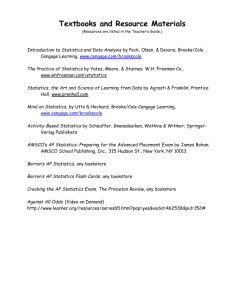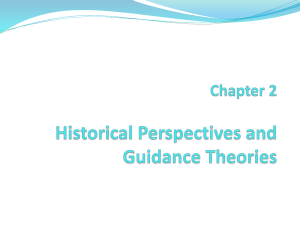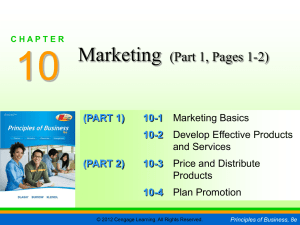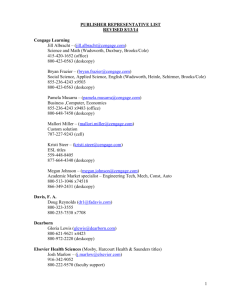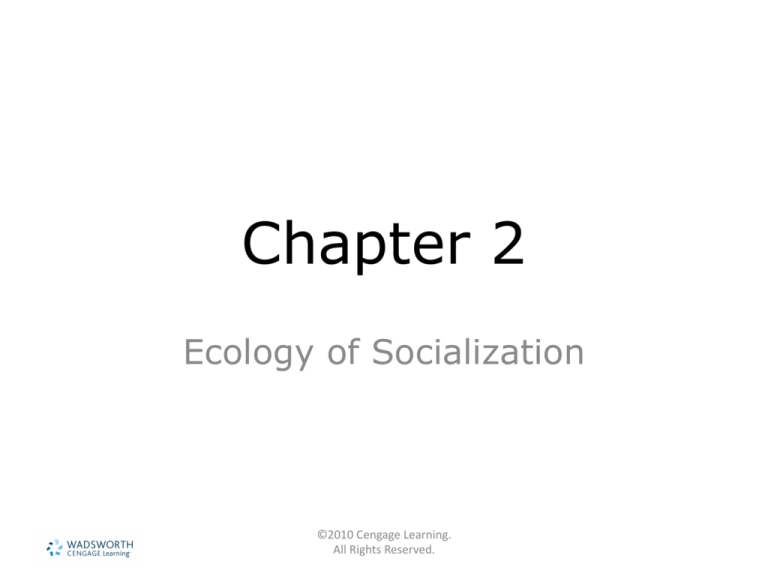
Chapter 2
Ecology of Socialization
©2010 Cengage Learning. All Rights Reserved. The childhood shows the man,
as morning shows the day.
John Milton
©2010 Cengage Learning. All Rights Reserved. Aims of Socialization
©2010 Cengage Learning. All Rights Reserved. Aims of Socialization
•
•
•
•
•
Develop self-concept
Enable self-regulation
Empower achievement
Teach appropriate social goals
Implement developmental skills
©2010 Cengage Learning. All Rights Reserved. Terms
• Self-Concept
– An individual s perception of his or her
identity as distinct from that of others
• Self-Esteem
– The value one places on his/her identity
©2010 Cengage Learning. All Rights Reserved. Erikson s Theory of Psychosocial
Development
Name
Developmental
Stage
Task
Trust vs. Mistrust
Infancy
Develop a basic sense
of trust
Autonomy vs. Shame
and Doubt
Early Childhood
Develop autonomy
Initiative vs. Guilt
Play Age
Develop initiative
Industry vs. Inferiority School Age
Develop feelings of
competence
Identity vs. Identity
Diffusion
Adolescence
Integrate early self
with changing self
Intimacy vs. Isolation
Young Adulthood
Establish intimacy
Generativity vs. SelfAbsorption
Adulthood
Establish and guide
the next generation
Integrity vs. Despair
Senescence
©2010 Cengage Learning. Reach end of life with
positive self-esteem
All Rights Reserved. Self-Regulation
• The ability to control one s impulses,
behavior, and/or emotions. . .
until an appropriate time, place, or
object is available for expression
©2010 Cengage Learning. All Rights Reserved. Developmental Task
• A task that lies between an individual
need and a societal demand
©2010 Cengage Learning. All Rights Reserved. Agents of
Socialization
©2010 Cengage Learning. All Rights Reserved. Agents of Socialization
•
•
•
•
•
Family
School and Child Care
Peers
Mass Media
The Community
©2010 Cengage Learning. All Rights Reserved. Egocentrism
• The cognitive inability to look at the
world from any point of view other
than one s own
©2010 Cengage Learning. All Rights Reserved. Cultural Differences
Orientation
Collectivist /
Individualistic
Active/Passive
Coping Style
Attitude Toward
Authority
Communication
Style
Submissive/
Egalitarian
OpenExpressive/
RestrainedPrivate
©2010 Cengage Learning. All Rights Reserved. Methods of
Socialization
©2010 Cengage Learning. All Rights Reserved. Methods
•
•
•
•
•
•
Affective
Operant
Observational
Cognitive
Sociocultural
Apprenticeship
©2010 Cengage Learning. All Rights Reserved. Affective Methods
• Include
– responses to others
– feelings about self
– feelings about others
– expression of emotion
©2010 Cengage Learning. All Rights Reserved. Attachment
• An affectional tie that one person forms to
another person, binding them together in
space and enduring over time
©2010 Cengage Learning. All Rights Reserved. Operant Methods
• Operant: Producing an effect
• Reinforcement
– An object or event presented following a
behavior that serves to increase the
likelihood that the behavior will occur
• Extinction
– The gradual disappearance of a learned
behavior following the removal of the
reinforcement
©2010 Cengage Learning. All Rights Reserved. Operant Methods
• Punishment
– Physical or psychologically painful
stimuli or the temporary withdrawal of
pleasant stimuli when undesirable
behavior occurs
• Feedback
– Evaluative information, both positive
and negative, about one s behavior
©2010 Cengage Learning. All Rights Reserved. Observational Methods
• Modeling
– A form of imitative learning that occurs
by observing another person (the
model) perform a behavior and
experience its consequence
©2010 Cengage Learning. All Rights Reserved. Cognitive Methods
• Instruction
• Setting Standards
• Reasoning
– Giving explanations or causes for an act
©2010 Cengage Learning. All Rights Reserved. Parenting Styles
• Authoritarian
• Parent-centered; Characterized by
unquestioning obedience to authority
• Permissive
• Child-centered; Characterized by lack
of directives or authority
• Authoritative
• Democratic; Authority is based on
competence or expertise
©2010 Cengage Learning. All Rights Reserved. Sociocultural Methods
Group Pressure Symbols Tradi=on Rituals and Rou=nes ©2010 Cengage Learning. All Rights Reserved. Apprenticeship
• A process in which a novice is guided
by an expert to participate in and
master tasks
• Structuring
• Collaborating
• Transferring
©2010 Cengage Learning. All Rights Reserved. Outcomes of
Socialization
©2010 Cengage Learning. All Rights Reserved. Outcomes
•
•
•
•
•
•
•
Values
Attitudes
Motives and attributions
Self-esteem
Self-regulation/behavior
Morals
Gender roles
©2010 Cengage Learning. All Rights Reserved.

